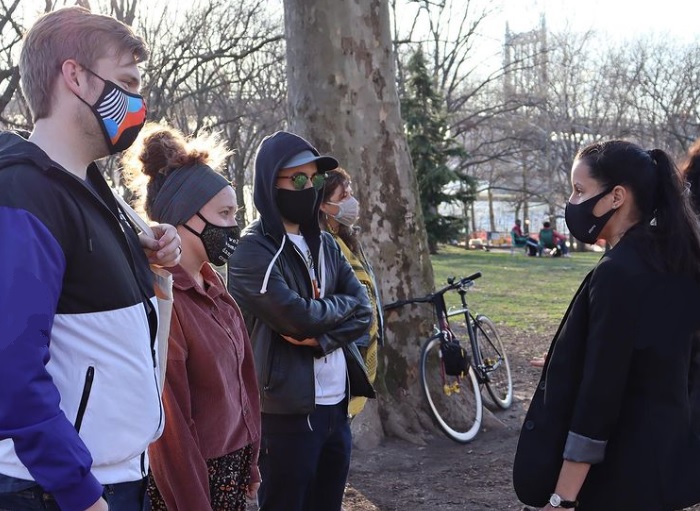
Tiffany Cabán speaking to District 22 residents in March 2021 (Photo : Instagram @cabanforqueens)
Dec. 20, 2021 By Allie Griffin
Astoria residents will once again have a direct say on how $1 million in city funds will be spent in the district.
Council Member Tiffany Cabán, who was sworn into office last month, is asking residents of the 22nd Council district how they want to spend more than one million dollars of public funds in the community.
Cabán announced the return of participatory budgeting — a process in which community members provide input on how a portion of the public budget is spent in their council district — last week.
Residents can suggest the money go toward projects that improve schools, parks, libraries, public housing and other public spaces through an online submission platform. Their suggested projects are then put up for a vote in the district and the projects with the most votes get funded and implemented.
Cabán said the project is a way that local residents can “co-govern” alongside her.
“I am absolutely thrilled to kick-off Participatory Budgeting Cycle 11 in District 22,” she said in a statement. “As a new City Council Member, I am looking forward to organizing members of our diverse community to decide how city dollars are spent, and ultimately, what the future of our city should look like.”
Cabán — whose district covers Astoria and parts of East Elmhurst, Jackson Heights and Woodside — is one of 10 council members who have opted into the participatory budgeting process for Fiscal Year 2023. Queens Council Member Adrienne Adams and Council Member-elect Jennifer Gutierrez (whose Brooklyn district includes part of Ridgewood) have also opened the process in their respective districts.
The program — which was introduced to the City Council in 2011 and is often called the “People’s Budget” — was paused last year due to the budget restrictions caused by the pandemic. Just a handful of council members decided to reopen it this year.
Want to know how all my District 22 neighbors can co-govern along with me?
I am thrilled to announce the return of…
???
?Participatory Budgeting!?
?…
— Tiffany Cabán (@tiffany_caban) December 13, 2021
Residents of participating council districts can submit their ideas and view others’ online.
Not all projects, however, are eligible for participatory budgeting. To qualify, a proposal must be a capital improvement that costs at least $50,000 and has a lifespan of at least five years.
However, Cabán is setting aside a separate pot of public money—$50,000— for smaller projects that don’t quality for traditional participatory budgeting. For example, this money can be used to start new community classes, plant local gardens, purchase art supplies for public art projects or buy equipment to maintain local parks.
Such projects should cost at least $5,000 and the money must go to organizations approved to receive city funding.
Residents have until the end of the year to submit their ideas. Their ideas are then vetted, refined and matched to a city agency or organization in January.
Voting will open to district residents in March. Residents must have an NYC-ID account, which can be opened here, in order to vote. The projects with the most votes are revealed in April.
Cabán and her colleagues who opted into the program will add the winning projects to the city budget in June for the following fiscal year. The projects are then implemented by the appropriate city agencies and/or community-based organizations.
District 22 residents have already submitted 10 ideas. Some ideas include renovating the playground at Rainey Park, creating a dog park east of 31st Street, adding more trash and recycling bins on 23rd and 24th Avenues, bringing back free swim lessons at Astoria Pool and planting more street trees throughout the district.
Residents have until Dec. 31 to submit their ideas.






